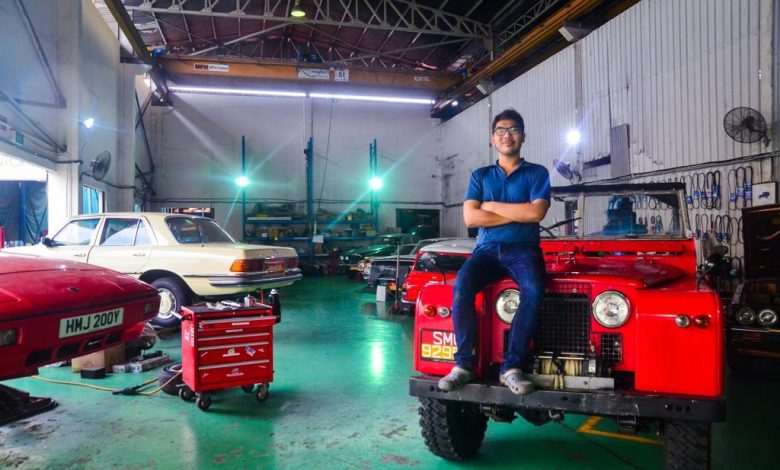Inside the Workshops: The Hidden World of Singapore’s Vehicle Caretakers

Car servicing Singapore unfolds in workshops tucked beneath towering HDB blocks and within industrial complexes that hum with the sound of pneumatic tools and diagnostic machines. In these spaces—some pristine and gleaming, others weathered by decades of use—men and women navigate the complexities of keeping the island’s vehicles running in a place where automobiles represent not just transportation but profound financial commitment and status.
The People Behind the Wrenches
Lim has been servicing cars for thirty-five years, his hands bearing the permanent traces of his profession—fingernails rimmed with stubborn grease, palms calloused and etched with fine scars from countless encounters with sharp metal edges. At fifty-seven, he represents a generation of mechanics whose knowledge was acquired through apprenticeship rather than formal education.
“Young people today, they come with certificates but don’t understand how to listen to an engine,” he says, wiping his hands on a rag that’s been washed so many times it’s nearly translucent. “Car servicing isn’t just about replacing parts. It’s about understanding the language each vehicle speaks.”
In a cramped office adjacent to the workshop floor, his daughter Michelle manages the business side, bridging traditional mechanical knowledge with digital systems that track inventory and customer relationships. This generational handover plays out across Singapore as family-run workshops adapt to changing expectations and technologies.
The Economics of Automobile Care
In a country where purchasing a vehicle often costs more than a small apartment in other nations, car maintenance carries heightened significance:
- The Certificate of Entitlement (COE) system means the average vehicle represents an investment of at least $100,000 SGD
- Proper maintenance can extend vehicle lifespan through the critical 10-year COE period
- Comprehensive service records significantly impact resale value
- The humid tropical climate accelerates wear on components designed for temperate regions
“Singaporeans have a complicated relationship with their cars,” explains Dr. Tan, a transport economist who studies consumer behaviour. “The financial burden of ownership creates anxiety that often manifests in maintenance decisions—sometimes leading to over-servicing and sometimes dangerous neglect.”
This economic reality shapes every aspect of the servicing industry, from pricing structures to customer communication strategies that must balance transparency with technical complexity.
Between Dealerships and Independents
The servicing landscape exists along a spectrum, with dealership workshops at one end and independent operators at the other. Each vehicle owner navigates this terrain according to their priorities:
- Dealership servicing offers warranty protection and specialised knowledge but at premium prices
- Independent workshops provide flexibility and often more personalised attention
- “Hybrid” arrangements emerge where owners use dealerships for major service intervals and independents for interim needs
- Mobile mechanics represent a growing segment, bringing services directly to residential carparks
For those without technical knowledge, this ecosystem can be intimidating. “Many of my clients are women who’ve had negative experiences elsewhere,” says Sarah, who opened her workshop five years ago after fifteen years as a technician. “They’ve been conditioned to expect condescension. I built my business by explaining rather than dismissing their questions.”
The Digital Transformation
Modern vehicles increasingly resemble computers on wheels, forcing a transformation in servicing approaches:
- Diagnostic procedures now begin with software rather than sensory evaluation
- Mechanics require continuous education to stay current with evolving systems
- Independent workshops struggle to access proprietary diagnostic tools
- Customer communication increasingly happens through apps and digital platforms
“Ten years ago, I could diagnose most issues with basic tools and experience,” says Rajesh, who manages a workshop in the eastern region. “Today, I invest more in software updates than physical equipment. The most valuable tool is no longer a wrench but the diagnostic computer.”
The Environmental Dimension
Singapore’s commitment to environmental sustainability creates new pressures and opportunities for the servicing sector:
- Stricter emissions standards require more sophisticated testing equipment
- Electric vehicle adoption demands entirely new servicing competencies
- Waste management regulations add complexity to routine maintenance procedures
- Recycled and remanufactured parts gain acceptance as quality improves
“We’re in transition,” explains an environmental compliance officer who works with automotive businesses. “The workshops that embrace these changes proactively will define the industry’s future. Those that resist will become increasingly marginalised.”
Finding Your Workshop Match
For vehicle owners, identifying the right servicing relationship involves considerations beyond price:
- Communication style matters—look for mechanics who explain rather than intimidate
- Transparency in quoting and billing indicates overall business ethics
- Physical workshop conditions often reflect attention to detail in servicing
- Specialisation in your vehicle type can matter more than general experience
- Proximity to home or workplace affects convenience for regular maintenance
“The best workshop isn’t necessarily the cheapest or most expensive,” advises a consumer advocate who reviews service providers. “It’s the one where trust develops through consistency and honesty.”
This relationship, when successful, transcends mere transactional exchange. Regular customers at Lim’s workshop bring festive foods during holidays and share family milestones. The mechanics remember their children’s names and vehicle quirks with equal precision.
As Singapore evolves toward greater automation and perhaps away from private vehicle ownership entirely, these human connections represent something increasingly precious—community built around shared understanding and expertise. Whatever technological changes arrive, there will remain a need for skilled hands and experienced eyes providing reliable car servicing Singapore.




